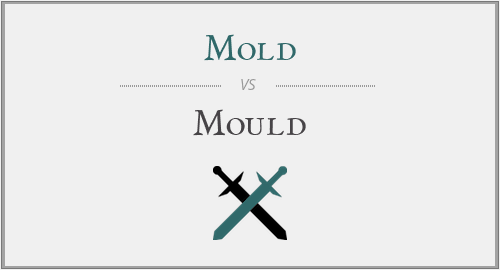British and American English have different rules when it comes to spelling the words. Americans omit the U that appears in some British words as a second vowel directly before a consonant. Therefore, mold ormould are a same word with same meaning and usage but different spellings.
In this article, I will differentiate between mold and mould by using them both in sentences with clear difference of the words acting as verb and noun respectively. At the end, I will share a method to remember the difference between the two words effectively.
Origin:
The world mould originated from Middle English: apparently from Old French modle, from Latin modulus. In another sense, it originated from late Middle English: probably from obsolete mould, past participle of moul ‘grow mouldy’, of Scandinavian origin; compare with Old Norse mygla ‘grow mouldy’. One more sense of the word indicated its origin from Old English molde, from a Germanic base meaning ‘pulverize or grind’; related to meal.
Mould as noun:
Mould is used as a noun which means a hollow container used to give shape to molten or hot liquid material when it cools and hardens.
The smith would pour the molten metal into the shaped mould.
Mould as a noun also means a furry growth of minute fungi occurring typically in moist warm conditions, especially on food or other organic matter.
The bread had mould on it due to the moist weather.
Mould also means soft loose earth.
The ground was soft and damp, with old leaves thick in the mould.
Mould as verb:
Mould is used as a verb which means to form (an object) out of malleable material.
Mould the figure from white fondant.
Use of mold:
Mold is just American spellings for the word mould.
Examples:
Inside, the rain had spawned black, green, and yellow mold that crawled the walls. [Atlantic]
Obama has been more in the mold of George H.W. Bush and his secretary of state. [Daily Beast]
If some of the insulation is intact, leave it in place unless it is moldy. [Boston Globe]
Use of mould:
Mould is just the British version of the word mold with the same meaning and context.
Examples:
Without air conditioning in a highly humid climate, mould could form. [Montreal Gazette]
And Pretty Ballerinas is still making shoes in the mould of the original pair created in 1918. [New Zealand Herald]
There’s no bread, and even the mouldy cheese has been chipped away at. [Scotsman]
Mold or mould:
Mold or mould are a same word with altered spellings, indicating fungus or a container for molten liquid when acting as a noun, or the action of forming something as a verb.
British English, to this day, uses 'mould' while Americans prefer 'mold.' Since 'mould' has the letter 'U,' just like 'United Kingdom,' it is easier to quickly remember which of the two words to use accordingly.





Have a discussion about this article with the community:
Report Comment
We're doing our best to make sure our content is useful, accurate and safe.
If by any chance you spot an inappropriate comment while navigating through our website please use this form to let us know, and we'll take care of it shortly.
Attachment
You need to be logged in to favorite.
Log In